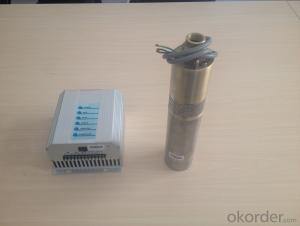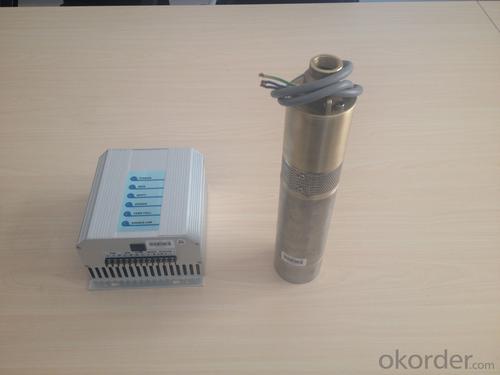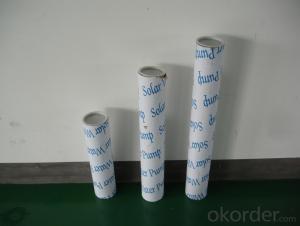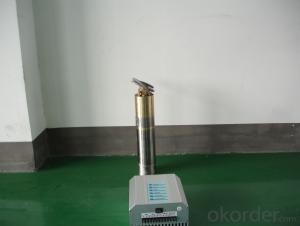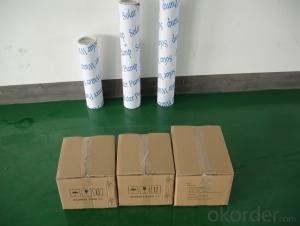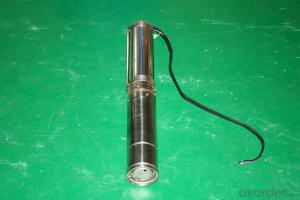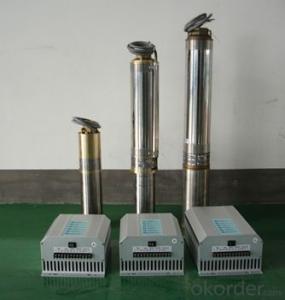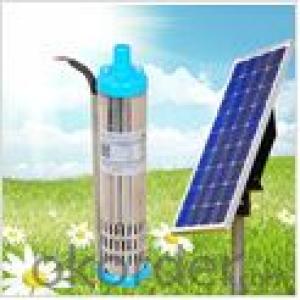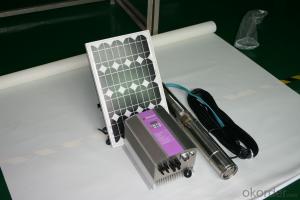Shakti Solar DC Solar Submersible Pumps
- Loading Port:
- China Main Port
- Payment Terms:
- TT OR LC
- Min Order Qty:
- -
- Supply Capability:
- -
OKorder Service Pledge
OKorder Financial Service
You Might Also Like
Item Description :
This superb new addition to our solar fountain range comes with a 10w solar panel,and a powerful fountain pump that is capable of producing fountains of up to 2m in height. As well as being easy to set up and use.Instruction manual is supplied for assembly and maintenance.
Solar Fountain Key Features :
Powered by direct sunlight
No high voltage electric mains required
Safe for children
Max. height of fountain: 2M
Max. flow capacity: 800 L/H(176 GAL)
10W Polycrystalline solar panel included
18V DC brushless pump
Solar Pump Features :
Can produce fountains up to : 2M (tube height) 1.4M (fountain height)
Comes with multiple nozzle accessories
Cable Length : 5M
Solar Panel Features :
10W peak power.
Polycrystalline highly efficient solar panel
Comes mounted in aluminium frame
Comes with ground stake and rotating knob so you can angle your panel toward the sun
What You Will Get :
10W solar panel
Solar pump
Ground Sake
Nozzle accessories
Precautions :
DO NOT alter or change the product itself or its components
Operate pump in freshwater only, never above 50 degrees celsius
Keep away from flammable liquids
Do not connect to any other power supply other than the included
- Q: Do solar pumps require any additional equipment?
- Yes, solar pumps generally require additional equipment such as solar panels, a controller or inverter, and a storage tank or battery system for storing the generated energy.
- Q: Can solar pumps be integrated with existing water filtration systems?
- Yes, solar pumps can be integrated with existing water filtration systems. Solar pumps can provide the necessary power to operate the filtration system, ensuring a sustainable and renewable source of energy. This integration allows for an efficient and environmentally friendly water filtration process.
- Q: How do solar pumps handle water with high bacterial or microbial content?
- Solar pumps do not have a direct mechanism to handle water with high bacterial or microbial content. However, solar-powered water pumps can be integrated with additional water treatment systems, such as filters or chlorinators, to address the issue of high bacterial or microbial content in water. These systems can effectively remove or disinfect the bacteria or microbes, ensuring safer water for various applications.
- Q: How does the distance between the solar panel and the pump affect the performance?
- The distance between the solar panel and the pump can have an impact on the performance due to the loss of energy during transmission. The longer the distance, the higher the resistance in the wires, which leads to energy loss. This can result in decreased efficiency and reduced pump performance. Therefore, minimizing the distance between the solar panel and the pump is crucial for optimal performance.
- Q: Can a solar pump be used for water supply in residential communities or housing complexes?
- Certainly, water supply in residential communities or housing complexes can be facilitated by the use of a solar pump. Solar pumps present a viable alternative to traditional electric pumps, deriving their power from clean, renewable, and abundant solar energy. These pumps employ photovoltaic panels to convert sunlight into electricity, which then fuels the pump to extract water from sources like wells, boreholes, or reservoirs and distribute it to the desired destinations. The utilization of a solar pump for water supply in residential communities or housing complexes offers multiple advantages. Primarily, solar pumps prove to be cost-effective in the long term since they eliminate the need for fuel or electricity, thereby reducing energy expenses. Additionally, solar pumps require minimal maintenance, further contributing to cost savings. Moreover, solar pumps are environmentally friendly as they do not generate any greenhouse gas emissions or contribute to air pollution. They also aid in water conservation through the incorporation of sensors and controllers that optimize water usage and prevent wastage. Reliability and efficiency are hallmarks of solar pumps, enabling their operation even in remote areas with limited access to the electrical grid. These pumps ensure a consistent and uninterrupted water supply throughout the day, effectively meeting the needs of residential communities or housing complexes. In conclusion, solar pumps emerge as an exceptional choice for water supply in residential communities or housing complexes. They offer a plethora of benefits, including cost savings, environmental sustainability, and dependable operation. By harnessing the power of the sun, solar pumps provide a sustainable and efficient solution for satisfying the water demands of residential areas.
- Q: Can a solar pump be used in reverse osmosis systems?
- Yes, a solar pump can be used in reverse osmosis systems. Solar pumps are commonly used to power reverse osmosis systems in areas where there is limited access to electricity. These pumps utilize solar energy to drive the water through the reverse osmosis membrane, providing a sustainable and environmentally friendly solution for water purification.
- Q: Can a solar pump be used for water supply in off-grid resorts?
- Yes, a solar pump can definitely be used for water supply in off-grid resorts. Solar pumps are a great solution for off-grid locations as they rely on the sun's energy to operate, eliminating the need for electricity from the grid. They are highly efficient, cost-effective, and environmentally friendly. Solar pumps work by converting solar energy into electricity to power the pump, which draws water from a source such as a well or a borehole. This water can then be stored in tanks or directly supplied to the resort for various purposes like drinking, irrigation, or swimming pools. Using a solar pump for water supply in off-grid resorts offers several advantages. First, it provides a reliable and consistent water supply even in remote locations where grid electricity may not be available. Second, it reduces the operational costs and dependency on fossil fuel-based generators, making it a sustainable solution. Additionally, solar pumps require minimal maintenance and have a long lifespan, ensuring hassle-free operation for the resort. They are also easy to install and can be customized to meet the specific water requirements of the resort, making them a flexible solution. Overall, a solar pump is an excellent choice for off-grid resorts looking for a sustainable and reliable water supply solution. It not only helps reduce their carbon footprint but also provides a cost-effective and efficient alternative to traditional water pumping systems.
- Q: How does a solar pump help in reducing the risk of crop failure?
- A solar pump helps in reducing the risk of crop failure by providing a reliable and sustainable source of water for irrigation. It harnesses solar energy to power the pump, eliminating the need for costly and unreliable fossil fuels. This ensures that farmers have access to water even in remote areas with limited access to electricity. With consistent and efficient irrigation, crops receive the necessary amount of water, reducing water stress and improving their overall health and yield. Consequently, the risk of crop failure due to drought or inadequate water supply is significantly reduced.
- Q: Does the size of the solar panel affect the performance of the pump?
- Yes, the size of the solar panel does affect the performance of the pump. The solar panel is responsible for converting sunlight into electrical energy, which powers the pump. A larger solar panel is capable of generating more electricity, providing a higher power output to the pump. This increased power output allows the pump to operate more efficiently and effectively, delivering a higher flow rate or achieving a greater lift height. On the other hand, a smaller solar panel may not generate enough electricity to meet the pump's power requirements, resulting in reduced performance and potentially leading to decreased flow rates or lift heights. Therefore, selecting the appropriate size of the solar panel is crucial to ensure optimal performance of the pump.
- Q: Can a solar pump be used for water supply in off-grid cabins or remote cottages?
- Certainly! A solar pump is absolutely capable of being utilized for water supply in off-grid cabins or remote cottages. In areas where access to the electrical grid is nonexistent, solar pumps serve as a fantastic alternative for water supply. They function by converting sunlight into electricity, which then powers the pump to draw water from various sources such as wells, boreholes, or other water reservoirs. This exceptional mechanism renders solar pumps highly efficient and environmentally friendly. In off-grid cabins or remote cottages, solar pumps prove to be especially advantageous as they eliminate the necessity of expensive and cumbersome fuel-powered generators or the inconvenience of connecting to the electrical grid. They provide a dependable and sustainable solution for water supply, ensuring that inhabitants have access to clean water for a multitude of purposes including drinking, cooking, bathing, and irrigation. Additionally, solar pumps are low-maintenance and possess an extended lifespan, making them a financially viable option in the long term. They require minimal upkeep and can withstand severe weather conditions, rendering them suitable for remote locations. Furthermore, solar pumps can be combined with water storage systems such as tanks or reservoirs, guaranteeing a continuous water supply even during cloudy days or at night. Overall, a solar pump represents an exceptional choice for water supply in off-grid cabins or remote cottages, offering a reliable, sustainable, and cost-effective solution.
Send your message to us
Shakti Solar DC Solar Submersible Pumps
- Loading Port:
- China Main Port
- Payment Terms:
- TT OR LC
- Min Order Qty:
- -
- Supply Capability:
- -
OKorder Service Pledge
OKorder Financial Service
Similar products
Hot products
Hot Searches
Related keywords
